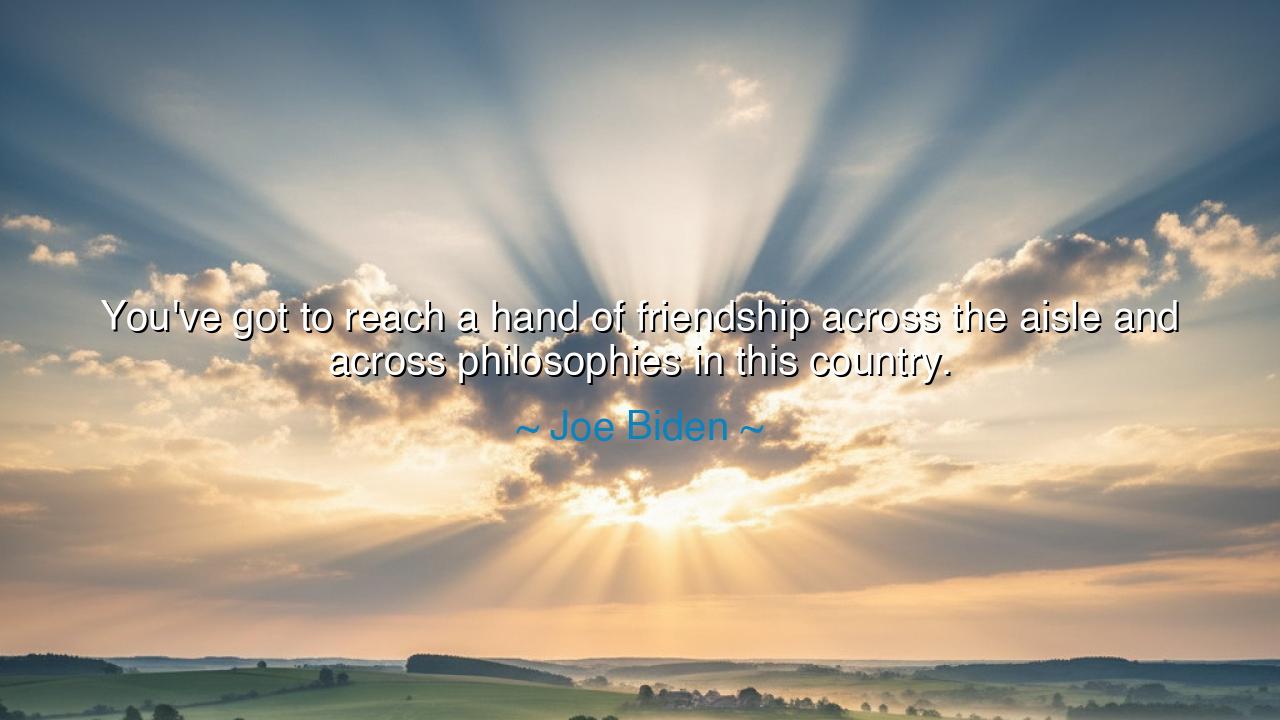
You've got to reach a hand of friendship across the aisle and
You've got to reach a hand of friendship across the aisle and across philosophies in this country.






In the words of Joe Biden, a man forged in the long halls of public life and tempered by loss, compassion, and endurance, there echoes a truth both ancient and ever-needed: “You’ve got to reach a hand of friendship across the aisle and across philosophies in this country.” Though spoken in the language of politics, these words speak to something far deeper — to the eternal human struggle between division and unity, pride and humility, self and the greater good. They are not merely a call to bipartisanship; they are a call to human fellowship, to the courage of understanding those with whom we disagree, and to the sacred act of extending the hand of friendship even when the heart trembles with resentment or fear.
From the dawn of civilization, every nation and tribe has faced the same test — whether to be governed by anger and separation or to seek the difficult peace that only empathy can build. Biden’s words, though born of modern America’s divisions, are in spirit the echo of older voices — the voices of peacemakers, of wise kings, of prophets who knew that no people can endure long if it forgets how to speak with itself. To reach across philosophies is to remember that the human heart beats alike beneath all banners and beliefs. For though men may differ in creed, in party, or in origin, they share the same longing: to be seen, to be safe, to belong.
There is an ancient story that mirrors this truth — the tale of Abraham Lincoln and his wartime rival, Edwin Stanton. Stanton had once mocked Lincoln as a "long-armed ape," scorning him in public speech and private jest. Yet when Lincoln became President, he did not repay insult with bitterness. Instead, he reached out to Stanton and appointed him Secretary of War, believing in the man’s skill and patriotism more than in his insults. Their working relationship, built upon respect and shared purpose, transformed into one of the deepest friendships of Lincoln’s life. And when Lincoln was struck down by an assassin’s bullet, it was Stanton who stood beside his deathbed and said, with tears, “Now he belongs to the ages.” Such is the power of reaching across the aisle — that an enemy may become a friend, and together they may serve something greater than either could alone.
Biden’s words, like Lincoln’s example, teach us that true strength does not lie in domination, but in conciliation. To reach a hand of friendship does not mean surrendering your beliefs or dimming your conviction — it means believing that dialogue is mightier than disdain, and that compassion can build bridges where pride builds walls. It means trusting that even those who oppose us may hold a fragment of truth we cannot yet see. For in the meeting of differences, wisdom is born. In the act of listening, healing begins.
But this reaching is not easy. It demands patience in the face of provocation, humility in the face of ego, and faith in the goodness that still dwells in humankind. It demands that we see our adversaries not as monsters, but as fellow citizens, shaped by their own fears and hopes. To live in a nation — or a family, or a friendship — is to live in constant negotiation with other souls. To reach across is therefore not weakness; it is the highest form of courage, the courage to build when others would burn.
Let us remember that every enduring civilization has survived only through the willingness of its people to meet one another in the middle. The great peace of the Iroquois, the Concord of Rome, the reconciliation of post-war Europe — all were born from leaders who understood that to clasp hands is to tame chaos. To refuse that gesture is to invite ruin. In every generation, there are those who would rather shout than listen, divide than mend. Yet, as Biden reminds us, the destiny of a people depends not on the loudest voices of hatred, but on the quiet courage of those who extend the hand of friendship.
So take this teaching, O listener, as a charge for your own life. When conflict arises — in your community, your home, your heart — do not wait for the other to reach first. Be the one who steps forward, whose hand is steady though the world trembles. Speak to those who differ from you not with scorn, but with curiosity. For unity does not mean sameness; it means harmony among differences. And remember: a bridge is built plank by plank, word by word, gesture by gesture.
The lesson, then, is clear: reconciliation is the highest art of humanity. To reach across the aisle — across creed, class, and philosophy — is to act not merely as a citizen, but as a guardian of the human spirit. Let friendship, not fear, be your offering to the world. For in every age and every nation, peace is not imposed from above — it is born in the moment one soul reaches out to another and says, “Come, let us walk together.”






AAdministratorAdministrator
Welcome, honored guests. Please leave a comment, we will respond soon